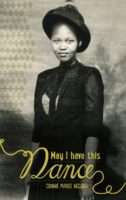When I was a child washing clothes in the river, the water always made such a noise that we had to shout to be heard. That was how I viewed these warnings, like the noise of water – to be ignored. I drew my confidence from the fact that Sol had opened up to me earlier, telling me how, when he became associated with beautiful lady dancers, he always took care to keep the involvement short in case they misinterpreted his attentions. I accepted his explanation and was greatly relieved that he had opened up to me because by then I was madly in love with him.
Sol, I learnt, had also gone to school in Butterworth. When he completed his Standard Six, he was awarded a bursary to study at Lovedale High and Teacher’s College. The bursary was a blessing, as his mother was unable to pay for his studies after Standard Six, although she always made sure she provided him with all the other necessities. His story was so similar to mine, and still fills me with awe for all the mothers in the country who have raised their children in difficult times through sacrifice and hard work.
When he was a little older, Sol played golf. He started off as a caddy, carrying golf bags to earn some pocket money – the beginnings of an entrepreneur were evident even then – which he saved up to buy a bicycle to ride to school and to visit his mother. In those days, only privileged children owned a bicycle. This was part of the reason I trusted him so. He could have used the money to buy cigarettes, sunglasses, takeaway food. He chose not to. To me, his actions spoke of a man with values, the kind of man who would use his talents wisely and fruitfully.
After completing his education at Lovedale, he briefly lived in Cape Town and Port Elizabeth before landing a job as a government clerk, which gave him the opportunity to be allocated a house. In those days, Africans could not buy land or own houses. Whatever homes we had, especially in urban areas, we lived in at the mercy of the municipality, paying monthly rent for the accommodation.
In 1948 he joined the post office as a clerk in a small office in Port Elizabeth. He also joined the ANC, a move that would eventually contribute towards my own political awakening. Before I met Sol, I belonged to the Youth League without really knowing what it stood for. It was only after I met him that I started going to meetings, marches and mass funerals, and gaining a true understanding of South Africa’s problems. Towards the end of 1949, Sol was transferred to a bigger post office in Duncan Village. This is where he worked when I met him.
Sol used his position at work and his role as a dance instructor to develop good values and habits in the young adults around him. He wanted those he worked with and taught to be people of stature; to have vision and ambition. He believed that all men and women should contribute to the growth and well-being of their community. In acting out this belief, he proudly displayed his dancing abilities, great sense of humour and captivating smile.
Early one Saturday evening, after dancing practice, as Sol escorted me back to the nurses’ home, he said to me, “This afternoon I visited a flower shop and spoke openly to the owner, an elderly lady.”
I waited for him to keep talking, but instead he took out a small parcel from his inner jacket pocket. He unfolded a silky-soft tissue with two red flowers in it – a rose and a carnation. He placed the rose in my palm and said, “Manse, this rose is a symbol of my love for you. And this” – he put the carnation in my hand – “is my heart. Always keep them safely together.”
My heart beat faster than a racehorse’s hooves. I couldn’t see properly and felt faint. I had to lean on the front door of the nurses’ home for a few minutes, just to regain my composure. When next I looked, he was gone.


